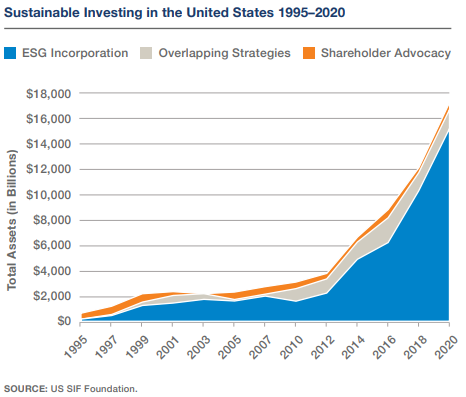What Does The Future Hold For ESG Reporting?

Environmental, social, and governance (ESG) matters have taken the oil and gas industry by storm over the last few years, emboldening many companies to reduce their emissions, rethink diversity and inclusion on their boards, reconsider shareholder rights or executive compensation, and/or inspire a change in the way they’re otherwise perceived by the general public. The push towards implementing ESG measures has coincided with an uptick in “green” investment funds and sustainable investing. While some have questioned the credentials of these ESG-linked funds, traction is gaining among investors for increased scrutiny around ESG reporting.
SEC’s Stance On ESG
The desire from investors for ESG and climate risk-related disclosures has resonated with the U.S. Securities and Exchange Commission (SEC). In April 2021, the SEC’s Division of Examinations (Division) issued a “Risk Alert” highlighting staff observations from examinations of investment advisors, registered investment companies, and private funds engaged in ESG investing[1].
The Risk Alert provides useful guidance regarding the types of compliance issues the SEC staff is reviewing in its examinations of investment advisers, examples of deficiencies the staff is finding, as well as instances in which the staff has observed effective compliance practices. Among the focuses of the Risk Alert were misleading statements made by investment companies and private funds, as well as the inconsistency of internal ESG processes. Accordingly, the Risk Alert provides a useful roadmap to assist investment advisers in developing, testing and enhancing their ESG compliance policies, procedures, and practices.

READ MORE: For ESG Investors, ‘Clean Fracs’ Could Mitigate Environmental Impacts
In July 2021, during a recent Climate and Global Financial Markets webinar, SEC Chairman Gary Gensler was quoted as saying, “Companies and investors alike would benefit from clear rules of the road. I believe the SEC should step in when there’s this level of demand for information relevant to investors’ decisions. Thus, I have asked SEC staff to develop a mandatory climate risk disclosure rule proposal for the Commission’s consideration by the end of the year”.
While the full detail of the SEC’s new disclosure rules has not been revealed, it’s clear that climate-related disclosures are a priority. Climate activism is an especially hot-button issue in an industry like oil and gas, as evidenced by increased activist activity at major companies and a new methane fee proposed within the $3.5 trillion budget legislation introduced in Congress.
Reporting on ESG metrics isn’t a novel concept to most oil and gas companies; in fact, many companies already produce voluntary “Sustainability Reports” that cover ESG disclosures. However, these reports currently rely on different frameworks and typically lack comparability. Frameworks used to disclose qualitative and quantitative ESG metrics include the Global Reporting Initiative (GRI), Sustainability Accounting Standards Board (SASB)[2], International Petroleum Industry Environmental Conservation Association (IPIECA), and the Task Force On Climate-Related Financial Disclosures (TCFD). Comparability across companies is key to deciding where to allocate investments or capital for investors and capital providers.
SEC Chairman Gensler also addressed this issue in his July webinar remarks, “I think we can bring greater clarity to climate risk disclosures. What might such disclosures look like? First, I believe they should be consistent and comparable. The consistency with which issuers report information leads to comparability between companies, today and over time”. These words accurately reflect today’s world in which investors and the public are no longer asking for proactive ESG reporting from oil and gas companies but, rather, are demanding it as the world looks towards the energy transition.
READ MORE: 3 Reasons Why ESG Is Here To Stay In The Oil & Gas Industry
Additionally, the SEC recently published a sample commentary letter related to the existing 2010 Climate Change Guidance[3]. One excerpt of note from the letter reads: “We note that you provided more expansive disclosure in your corporate social responsibility report (CSR report) than you provided in your SEC filings. Please advise us what consideration you gave to providing the same type of climate-related disclosure in your SEC filings as you provided in your CSR report”.
This quote is especially relevant to the oil and gas industry, as many oil and gas companies already produce either CSR reports or similar sustainability reports. The SEC faces a significant challenge in evaluating and potentially codifying ESG disclosures currently being utilized by public registrants, but not leaving the “door” open for a divergence in practices within or across industries. Private companies will likely follow suit and ESG disclosure concerns should not be limited to companies in the fossil fuel extraction sectors.
Summary
Irrespective of varying personal opinions on the energy transition, it has become clear that ESG will continue to be an ongoing policy priority of the current U.S. presidential administration and governments around the world. If the words of the SEC Chair hold true, the SEC will soon be implementing either new or revised disclosure requirements. The SEC’s increased focus on ESG investment strategies heightens the need for companies to make sure their disclosures align with investment practices and that there is sufficient knowledgeable oversight by compliance personnel to avoid divergence between the two over time.
Opportune understands the importance of integrating SEC requirements with business strategy for long-term financial and operational benefit. We believe our deep reporting and industry expertise will add value to clients in helping them achieve their energy transition goals through tailored and customized ESG solutions that directly address the needs of investors and stakeholders.
[1] See chart above for growth in ESG investing published by The Forum for Sustainable and Responsible Investment.
[2] The SASB and GRI completed a merger in June of 2021 to create the Value Reporting Foundation (VRF).
[3] The SEC previously released “Commission Guidance Regarding Disclosure Related to Climate Change” 2010 regarding disclosures as they relate to climate change matters.
Related Insights
Looking for expertise in the energy industry? We’ve got you covered.
Find out why the new landmark legislation should provide a much-needed boost for the development of carbon capture.


